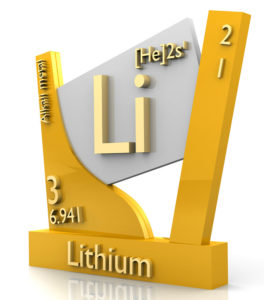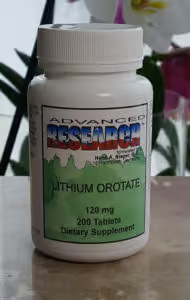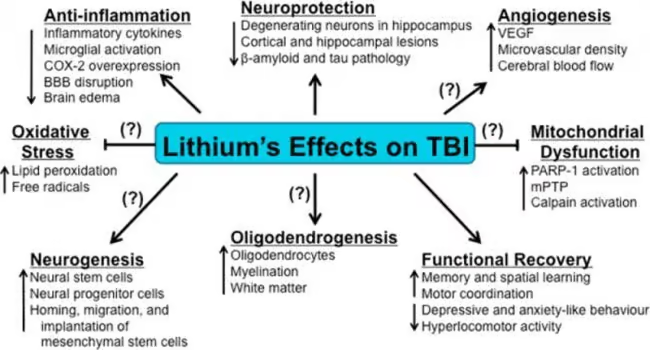Table of Contents
Key Takeaways
- Lithium is a natural alkali metal essential for reproductive health and overall wellness in humans and animals.
- Historically used for therapeutic purposes, lithium is studied for its neuroprotective and mood-stabilizing effects.
- Micro-dosing lithium through supplements like Lithium Orotate offers cognitive benefits such as mood balancing, promoting growth factors and neurogenesis, and brain protection.
- Adequate lithium intake from diet and water may help prevent mental and neurological diseases, while low levels can be associated with depression, anxiety, and memory decline.
- Lithium Orotate is a popular micro-dosing option that provides mood stabilization, neuroprotection, and cognitive enhancement without toxic side effects of higher doses.
Lithium is a soft, silvery-white alkali metal so reactive (it sparks when it touches water) that it’s not found in nature on its own. Instead, it’s found in mineral compounds and in mineral water.
Cosmologists believe that lithium was one of the 3 elements synthesized in the Big Bang.[i] So it’s been around for a long time.
Most of us associate prescription lithium with treating mental illnesses like bipolar disorder and mania (lithium carbonate). Or the lithium-ion battery in our phone. Which has a tendency to blow up occasionally.
Turns out that the anti-psychotic medication lithium isn’t even a drug. It’s actually a naturally occurring mineral. Lithium salts are part of the same family of minerals that include potassium and sodium.
As a nootropic, micro-dosing lithium provides some amazing anti-aging benefits. Recent research shows that low-dose lithium may also help slow the progression of neurodegenerative diseases like Alzheimer’s, dementia and Parkinson’s disease.
Low-dose lithium also helps neurogenesis and memory. And is a mood stabilizer.
Here we’ll investigate daily or frequent use of Lithium Orotate as a nootropic, and how it benefits cognitive health.
Lithium helps:
- Balance mood. Lithium calms mania (extreme highs and lows) by decreasing sensitivity of the post-synaptic norepinephrine receptor.[ii] And increases uptake of norepinephrine into synaptosomes. Preventing the release of this neurotransmitter. And lithium enhances the transport of Vitamin B12 and folate into brain cells.[iii] Affecting mood and aggression.
- Growth Factors. Lithium upregulates brain-derived neurotrophic factor (BDNF), nerve growth factor (NGF), neurotrophin-3 (NT3) and their receptors. And lithium stimulates the proliferation of stem cells in the brain. All boosting neurogenesis and assisting in repair from all types of brain injury.[iv]
- Neuroprotection. Lithium increases brain gray matter, increases DNA replication for neurogenesis, prevents apoptosis, increases N-acetyl-aspartate (NAA), inhibits beta-amyloid secretion and protects against damage once it’s formed, chelates aluminum, and protects against glutamate toxicity.
Overview
Lithium is an alkali mineral and one the trace elements considered essential for both animal and human reproductive health, and general health and wellness.
Discovered as a chemical element in 1817, lithium’s first recorded modern medical use was in 1871 for the treatment of mania.
But the use of lithium for therapeutic use goes back to ancient Greek and Roman times. People enjoyed soaking in alkali springs to help with physical and mental illness.
People have been using mineral springs for therapeutic use ever since. Lithia Springs in Douglas County, Georgia was so popular that people came for miles just to drink the water.
The Sweet Water hotel, a luxury 500-room resort was opened in 1887. And attracted famous authors, business people and prominent politicians who came for the spring’s health benefits. The name “Lithia” stems from water rich in lithium.
Studies from around the world have shown the critical health benefits of lithium. One study using data from 27 Texas counties from 1978 – 1987 found that rates of suicide, homicide and rape were significantly higher in counties whose drinking water contained little or no lithium.[v]
Another study of lithium levels in tap water in 18 municipalities in Japan showed standard mortality ratios lower in places with higher lithium levels.[vi]
Yet another study conducted in Texas in 2013 confirmed the original findings in that state. Drinking water samples from 226 counties found a correlation between lithium levels and suicide rates.[vii]
Researchers who conducted meta-analyses of lithium levels and public drinking water suggested “increasing lithium levels of drinking water could potentially reduce the risk of suicide, and justify administering lithium to tap water.”[viii]
An article in the Lancet in 1949 by John Cade is credited for the modern medical use of lithium as an effective treatment for manic psychosis.[ix]
The United States FDA approved high dose lithium carbonate and lithium citrate in 1970 for the treatment of bipolar disorder. Carbonic acid and citric acid are mineral carriers used to transport lithium throughout your body.
Doctors also prescribe lithium off-label for treating migraines, seizure disorders and psychosis usually after other treatments have failed.
But as we dig deeper into the most recently published research on lithium, we realize this trace element is essential for optimal health and brain function.
The lithium we get from our diet prevents many neurological and psychiatric problems. Micro-dosing lithium as a nootropic with a supplement like Lithium Orotate can help make up for the what we don’t get from our food and water.
Lithium is naturally available from fish, processed meat, milk, dairy products, eggs, potatoes and vegetables. Your typical dietary intake of lithium can range from 2 – 600 mcg. Amounts vary depending on where the food is grown.
How does Lithium work in the brain?
Lithium helps brain health and function in several ways. But two in particular stand out.
- Lithium stabilizes mood. Recent research has discovered that lithium’s mood stabilization effects may be due to its ability to boost the production of new brain cells (neurogenesis).
Lithium inhibits the enzyme glycogen synthase kinase-3β (GSK-3β). This inhibition upregulates brain-derived neurotrophic factor (BDNF), and insulin-like growth factor-1 (IGF-1) which stimulates neural stem cells to produce new neurons in the hippocampus.[x]
When neural stem cells produce new neurons in the hippocampus, mood and memory work as designed. But a breakdown in neurogenesis results in mood disorders.
Lithium has long been known to control mania and stabilize mood in bipolar patients. But it was not generally thought of as an antidepressant. Researchers in Tel Aviv provided the first evidence that inhibiting GSK-3β exerted a rapid antidepressant effect in mice.[xi]
Another team at Howard Hughes Medical Institute in Pennsylvania showed that feeding mice chow laced with low-dose lithium for 15 days produced a dose-dependent antidepressant effect.[xii]
Lithium induced gene transcription in the hippocampus, amygdala and hypothalamus. All areas implicated in depression, anxiety, bipolar disorder, autism and schizophrenia.
- Lithium protects your brain. Your brain cells are at constant risk of damage from exposure to toxins you encounter every day from food, air, water and your environment. And the excitotoxins produced by ordinary brain cell metabolism.
Glutamate plays a major role in the synaptic plasticity needed for learning and memory.[xiii] But over-activity of glutamate on its NMDA receptors causes neuron death and is implicated in Alzheimer’s, Huntington’s and Parkinson’s disease. Lithium inhibits this overactivity.[xiv]
Lithium also increases the production of a neuroprotective protein called bcl-2.[xv] Researchers maintain that lithium is the only “medication” that has been demonstrated to significantly increase bcl-2 in several brain areas.
Lithium has also recently been evaluated in preventing and treating traumatic brain injury. In a study conducted in 2014, Dr. Peter Leeds stated that lithium had “demonstrated robust beneficial effects in experimental models of Traumatic Brain Injury (TBI). These include decreases in TBI-induced brain lesion, suppression of neuroinflammation, protection against blood-brain barrier disruption, normalization of behavioral deficits, and improvement of learning and memory, among others.”[xvi]
How things go bad
In 1985, the United States EPA estimated that dietary intake of lithium from food in the USA varied from 0.6 to 3.1 mg per day.[xvii] For comparison, people who live in the Andes in Northern Argentina consume 2 to 30 mg per day, with 2 – 3 mg just from drinking water.[xviii]
As your dietary sodium and caffeine increases, so does lithium excretion in urine which increases your requirement for this essential trace mineral.
Your exposure to stress and toxins from things like mercury, aspartame, MSG, Bisphenol A (BPA) and other excitotoxins also raise cortisol and other stress hormones. Increasing your need for more water-soluble nutrients like B-vitamins, magnesium, zinc and lithium.
Low lithium levels are associated with …
↑ Depression and anxiety increase
↓ Memory and learning ability decline
↑ Insomnia increases
↑ Sensitivity to stress and chronic pain increase
↓ Natural healing processes decline
Adequate daily intake of lithium could help prevent many mental and neurological diseases due to this trace minerals effects on nervous system metabolism. And it’s anti-inflammatory and antioxidant effects.
Lithium Orotate benefits
The clinical research and studies on the neuroprotective benefits of lithium are so overwhelming, some scientists are beginning to ask “why isn’t everyone using lithium”?
Here’s a summary of how micro-dosing lithium using Lithium Orotate can benefit your brain.
- Inhibits apoptosis – lithium inhibits GSK-3 which has been linked to apoptotic cell death
- NMDA-receptors – lithium reduces glutamate induced toxicity mediated by NMDA-receptors which helps in mood disorders, Alzheimer’s, and other autoimmune and inflammatory diseases
- Neuroprotection – blocks the development of beta-amyloid tangles and plaque
- Neurogenesis – lithium promotes the increase of brain-derived neurotrophic factor (BDNF) needed for synaptic plasticity in learning and memory. Lithium also boosts nerve growth factor and glial-derived neurotrophic factor affecting learning, memory, mood and overall brain health[xix]
- Neuronal stem cells – lithium stimulates the stem cells needed to produce new neurons (neurogenesis)
- Stabilizes mood – lithium is known for providing a calming effect in healthy people as well as those dealing with depression, bipolar disorder, and mania
- Suicide prevention – adequate levels of lithium has been shown to reduce suicide risk in multiple studies worldwide
- Depression – lithium helps with treatment-resistant depression. In fact, lithium has been shown to improve the effectiveness of antidepressant medications
- N-acetyl aspartate (NAA) – lithium increases NAA which has been associated with higher IQ scores[xx] (i.e. lithium will make you smarter!)
The benefits of supplementing with lithium go far beyond just optimizing cognitive health. Lithium also helps decrease insulin resistance, helps in treatment of alcoholism and other addictions, supports bone health, balances your circadian rhythm and more.
How does Lithium Orotate feel?
My personal experience with Lithium Orotate has made me a believer in micro-dosing lithium. I’m Adult ADD and deal with mood swings from time to time.
If I’m going around the bend because something upset me, I take 5 mg of Lithium Orotate. Within 15 minutes my mood stabilizes and I feel normal again. Consistent use puts me in a happy mood.
Many others report you’ll feel the results taking a low dose of lithium quickly. But for some, the full effect can take anywhere from 1 to 3 weeks. Micro-dosing 5 – 10 mg of lithium daily results in consistent results within a month or two for some. I’ve experienced great results within a couple of days.
So if you lash out at people in anger, and don’t fully understand why you get so angry – it could be your lithium levels are low.
Many neurohackers with depression and anger issues notice results quickly. Within the first couple of days you should feel more calm, relaxed, and experience less stress.
Keep in mind that lithium at any dose is not for everyone. But if you get adequate lithium from your diet and water, and still experience some of the mood swings talked about in this review, you could be dealing with other issues. You should know within a couple of hours of supplementing with low-dose lithium if this supplement is for you.
For some, Lithium Orotate means feeling excited about life for the first time in a long time. Anxiety and social anxiety are no longer a problem. Life is more fun and enjoyable.
Some say Lithium Orotate works better than any prescription that they’ve ever tried to treat severe depression. It provides a nice, smooth mood balance without all the toxicity associated with mega-doses of lithium carbonate.
If you’re dealing with PTSD or mild insomnia, you may want to try Lithium Orotate. Focus could improve, racing thoughts diminish and motivation levels could increase. You’ll have more coping ability.
Lithium Orotate Clinical Research
Lithium Improves Memory
A study at McMaster University in Canada set out to determine the effects on hippocampus volume in 14 bipolar patients who received lithium therapy.
The researchers examined the effects of lithium on hippocampal volumes and memory performance and recall over 2 – 4 years. The patients had not received any type of medication prior to using lithium.
The study found increases in hippocampus volume over time. And evidence of improvement of verbal memory performance over the 4-year measurement period.
The researchers concluded that the results of the study were consistent with the literature stating the neuroprotective effects of lithium. And that long-term lithium treatment is associated with preservation of memory and recall due to increased hippocampus size.[xxi]
Lithium Increases Mood in Recovering Addicts
24 adults recovering from heroin or methamphetamine addiction participated in a study in San Diego. Group A received 400 mcg per day of lithium taken orally for 4 weeks. The placebo Group B naturally took a non-active placebo.
Subjects completed a mood test questionnaire containing questions about their ability to think, work, mood and emotions. For the lithium group, mood test scores increased steadily and significantly during the 4 week period.
The lithium group also reported significantly increased levels of happiness, friendliness and energy. Group B showed no improvement during the same period.
The researchers concluded that low-dose lithium provided a mood-improving and stabilizing effect.[xxii]
Lithium Orotate in the Treatment of Alcoholism
In this study, 42 alcoholic patients were treated with Lithium Orotate during alcohol rehabilitation in a private clinical setting for six months. The data was collected from clinical practice records for the 10 years following the initial study.
The patients received 150 mg of Lithium Orotate daily for six months along with calcium orotate, magnesium orotate, bromelain and essential phospholipids.
Ten of the patients had no relapse from 3 – 10 years. 13 patients stayed sober from 1 – 3 years. The remaining patients relapsed between 6 – 12 months.
The researchers concluded that Lithium Orotate therapy was safe in treating addiction with minor adverse side effects.[xxiii]
Lithium Orotate Recommended Dosage
Lithium retains a grim and undeserved reputation. Likely because it was originally associated with serious mental illness. And like most medications, lithium can produce serious side effects if not monitored properly.
Lithium carbonate or lithium chloride salts are typically prescribed for long-term control and to treat bipolar disorder at 900 – 1200 mg per day. The major problem with such high doses of lithium are some very serious and debilitating side effects.
For nootropic use, I suggest Lithium Orotate which typically contains only 5 mg of elemental lithium. Lithium Orotate is orotic acid combined with lithium.
Orotic acid reportedly makes the lithium more bioavailable than lithium carbonate. The lithium is released once it crosses the blood-brain barrier. So you’ll get the benefits of lithium supplementation while avoiding the toxic side effects of high doses.[xxiv]
Lithium Orotate supplements recommended dose is 5 mg two or three times per day. See “Where to buy Lithium Orotate” for more on lithium amounts in nootropic supplements.
Many neurohackers use Lithium Orotate only as needed. For example, when feeling anxious or in the middle of a mood swing.
For someone with bipolar disorder or manic disorders, increasing to two 5 mg tablets up to 3-times per day may be more effective.
Naturopathic doctors suggest stacking 1,000 mg of Omega-3 and 400 UI of Vitamin E (as mixed tocopherols) each day you’re using Lithium Orotate.
Lithium Orotate Side Effects
Do not confuse Lithium Orotate with lithium carbonate. The carbonate version of lithium is only available by prescription and comes with a host of side effects.
Prescription lithium used in excess has been shown to have adverse effects on thyroid and kidney function. This is NOT a problem when supplementing with Lithium Orotate when used at recommended dosages.
Lithium Orotate at low doses is non-toxic and lab tests are not required to monitor your lithium levels because it does not show up in blood samples.
Lithium Orotate should not be used if you are dealing with significant renal or cardiovascular disease, severe dehydration or sodium depletion, or if you’re taking diuretics or ACE inhibitors.
Do not use Lithium Orotate if you are pregnant or breast-feeding.
You should check with your doctor if you are on any medication before using Lithium Orotate.
Where to Buy Lithium Orotate
Mother Nature has already put the antipsychotic “drug” lithium in drinking water. And you get some lithium from food depending on where it’s grown.
Supplemental Lithium Orotate typically comes in 120 or 130 mg capsules or tablets containing 5 mg of elemental lithium.
I recommend and use Click for Advanced Research Lithium Orotate(Amazon) which was formulated by Dr. Hans Nieper.
Nootropics Expert Recommendation
 Lithium Orotate 5 mg 2 or 3 times per day.
Lithium Orotate 5 mg 2 or 3 times per day.
I recommend using Lithium Orotate as a nootropic supplement if you’re feeling anxious or depressed. Or experiencing mood swings.
Your body does not make lithium on its own. So you must get this essential trace mineral from your diet, or a supplement like Lithium Orotate.
Lithium combined with orotic acid makes Lithium Orotate which readily crosses the blood-brain barrier, and you should feel its effects within 15 – 20 minutes of taking it.
Lithium Orotate is especially effective if you’re feeling stressed, or mentally overworked. Your brain uses lithium faster and it needs to be replaced. Which you can do by using Lithium Orotate.
Lithium Orotate is great if you are ADHD because lithium calms the hyperactivity in your brain.
Lithium supplements do not change your state of consciousness. It simply helps bring you back to feeling normal and happy.
I suggest trying Lithium Orotate as a nootropic supplement with your first dose at 5 mg and see how you react. If you experience no negative reaction, try another 5 mg in a few hours. Up to 3 – 5 mg doses per day.
You’ll likely experience the full benefits of Lithium Orotate within a week of consistent use.
I recommend and use Click for Advanced Research Lithium Orotate(Amazon)










Join The Discussion - 865 comments
Vishavjeet Singh
May 14, 2020
Hey David, you are love of the nootropics community.
I am a healthy young adult without any disease. I use nootropics for cognition, mood enhancement and productivity.
I have never used Lithium Orotate before.
Question 1: Is it safe to combine 100 mg modafinil in the morning + Lithium Orotate 2.5 mg in the morning and 2.5 mg in the night.
Question 2: I wanted to start with a low dose as a first timer but instead of 2.5 mg twice a day, should I use 5 mg twice a day or 5 mg once a day?
David Tomen
May 14, 2020
Vishavjeet, you’ll have better results with 5 mg Lithium Orotate. But most use it as needed. So you could do 4 doses during the day if you wanted.
I’m not aware of any contraindication with Modafinil. So try one dose first and see how it feels.
Ida Pav
May 8, 2020
Hi,
After watching your video about Lithium Orotate I was very excited to discover something new and I ordered Advance Research Lithium Orotate.
I took it for two days in a row, 5 mg in two doses, morning/evening, and was very much awake during both of these nights. My mind just couldn’t turn off. It was not like mind under stress or anxiety; actually, I was feeling good but wide awake.
Is it possible that Lithium Orotate caused insomnia?
I am trying LO because I have long lasting history of mood swings, depression and occasional anxiety and insomnia. I tried various antidepressants, but nothing worked for me, and I could not tolerate side effects. Talk therapy also did not help much, so I do believe I do have some chemical imbalance that is causing my mental challenges.
Should I continue with Lithium and see if it improves over time, and just taking it in the morning, or should I discontinue?
It is difficult to say if I feel any benefits yet (3rd day, took 10 mg in the morning), because of lack of sleep I do not feel well.
I was hoping this would be my miracle drug 🙂 I tried many other supplements you recommended, but with no positive effects..
Thank you for all the good work !
David Tomen
May 10, 2020
Isa, I don’t see how Lithium Orotate could contribute to insomnia. Take a look at this section: https://nootropicsexpert.com/lithium-orotate/#lithium-to-the-rescue. If anything, it should provide a calming effect which should help you settle down and sleep. Lithium Orotate is the best thing I know of for mood swings.
Some doctors suggest you’ll have more success with Lithium Orotate is to use it with 1,000 mg of DHA (Omega-3) and 400 UI of Vitamin E (as mixed tocopherols) each day you’re using Lithium Orotate.
But for depression it’s going to take more research and experimenting on your part. Please read closely my piece on depression here for some ideas: https://nootropicsexpert.com/best-nootropics-for-depression/
One thing you need to be clear on is there is no “one pill” cure nor any “miracle drug” for any of the maladies us humans deal with. It often takes a stack of several supplements to bring things under control before we feel better. And the only way to make this work is to be willing and open-minded enough to experiment with various nootropics until you find the best combination for you. It takes time and patience but if you stay with it you will success.
Ida
May 18, 2020
Thank you so much for your reply. I really appreciate that.
I am not sure about Lithium Orotate. I am still experimenting, taking it in the morning, so far 12 days since started, hoping to get some of the benefits. I noticed some changes and that is why I am continuing trying. However, it has not been all blissful like in the reviews from people that had positive experiences. I need to mention that I am in a very turbulent period of life, and that drives many difficult emotional states that I would like to relieve.
So far, I had been taking one or two tablets of Lithium Orotate in the morning. Soon after I would experience a lot of anger and agitation, but at the same time I would get like a filing of a clearer insight in things in my life that I am unsatisfied with. I would get a filing like I am finally admitting the truth to myself and am not longer lying about what I want, and that made me angry. I am not sure if this makes any sense, could this be just adverse reaction to this supplement? Strange feelings, I never felt that way before. Besides that, I also noticed more energy for exercising and enjoyment in moving my body, and vivid dreams that I actually remember in detail, even the day after.
I am also taking Gotu Kola and Bacopa, one capsule of each in the morning and MagTein/Tryptophan/Cherry Tart before sleep. This winter I had terrible insomnia but I was lucky to find your video about the best sleep supplements and ordered exactly what you recommended. That worked like magic, I started to sleep again. My sleep is not perfect yet, but after so many sleepless months, even 6 hours of sleep feels like heaven. I have enough energy to do live an active life. Thank you so much for that information, in my case that was a lifesaver.
I have ordered NAC today, and will try it to see if that is something for me. I am looking for a solution to improve my mood, and I am true believer that right supplement can make a huge difference.
All the best:)!
Kelly
July 7, 2020
Lithium works with B12. If you’re not taking methylcobalamin or adenosylcobalamin — the best forms of B12 — then the lithium may possibly be depleting your b12 levels.
When I added methylcobalamin, I was able to sleep 2 hours longer than usual — the first time in YEARS.
David Tomen
July 8, 2020
‘Tis true. Lithium is involved in the transport of Vitamin B9 and B12 into brain cells. https://link.springer.com/article/10.1007/s12011-018-1455-2. And Vitamin B12 deficiency seems to come up especially in those being treating for “mood disorders” with high dose lithium. https://pubmed.ncbi.nlm.nih.gov/9951569/
Maaike
April 8, 2020
Hi, thank you for all this information!
I have a question.
I have mthfr 677 and my main issue is that I am so tired , do fatigued! ( I am a woman, 40)
I already cleaned my diet up, take liver and oysterpowder, greenjuices, tmg, vitamin c and msm and some more. I ttied methyllated vitamins, but I felt really really bad on them.
Now, with the things above, I feel a little better, but not yet there. So somebody suggested lithium orotate. I have been on it for 2 days now and again tired tired tired and no motivation. Is this something I have to go through?? I feel like when the b vitamins are pushed in the cell or something, the tiredness begins. Headaches too. So I wonder, should I push through or stop?
Hope you can help me!!
Kind regards
Maaike from The Netherlands
David Tomen
April 23, 2020
Maaike, if Lithium Orotate makes you feel like that I would avoid it. This is the type of thing that can only be helped by working with doctor who knows how to treat MTHFR issues. Because supplementation along with testing is needed to get you back to feeling good.
Edward
April 3, 2020
1Is there a difference – to take lithium Orotate with a food o without it?
2It says that you should keep it in a cold place – how cold it should be?
David Tomen
April 23, 2020
Edward, lithium is a mineral and is neither fat nor water-soluble as far as I can tell. So it does not matter if you use it with food or not. And minerals don’t care how hot or cold they are either.
Edward
April 3, 2020
Hi,
1 can I use Lithium Orotate during a course of PhenilPhiracetam, Dopa Mucuna, and L-Carnitine?
David Tomen
April 23, 2020
Yes
James Davis
April 2, 2020
Can you stop lithium orotate without any withdrawals or side effects without having to taper off
David Tomen
April 23, 2020
James, yes you can.
Michael Wagner
March 21, 2020
Can I take LO with Prozac? I’m starting Prozac but have found some great information on Lithium orotate and wanting to add it to the mix. Thanks
David Tomen
March 21, 2020
Michael, lithium has been shown to improve the effectiveness of antidepressant medications. And I’m not aware of any direct contraindications.
But I’ve found this site to a great way to check: https://www.drugs.com/drug_interactions.html. Just look for Prozac using their search function. And you’ll get an alphabetical list of drugs and compounds that it’s contraindicated with.
Dr. Sam LokarDio
March 13, 2020
Hi David, is there any nootropic that can help with Childhood emotional abuse?
For example, the person doesn’t feel pain or pleasure. He just thinks and replies everything logically. He doesn’t have emotions anymore because those emotions were either neglected or unvalidated in the childhood.
Anything that can help the Hippocampus to regrow and stop the Amygdala to constantly think every interaction as an “attack”. So that the person can restart their life and have all those childhood emotions and feelings associated with them.
One more thing, can fasting help to reverse this condition in your opinion?
David Tomen
March 14, 2020
Dr. Sam, it sounds like you are describing anhedonia. I did research on how to treat anhedonia last year for an email. And what I found was the best method for treating it was ketamine. But we can’t buy ketamine over the counter so I looked up how it works in the brain. And came up with a list of 5 nootropics that effected the same thing. The email with suggested nootropics is here: https://mailchi.mp/ed0e21d51fbc/new-how-to-design-a-personal-nootropic-stack
Anonymous
July 31, 2020
Hi David!
This articles say a lot of stuffs about it. Could you give some comments on this? Thank you.
https://www.ncbi.nlm.nih.gov/pmc/articles/PMC4249906/
David Tomen
July 31, 2020
That clinical study about about Rhodiola Rosea. Not sure how this relates to Lithium Orotate.